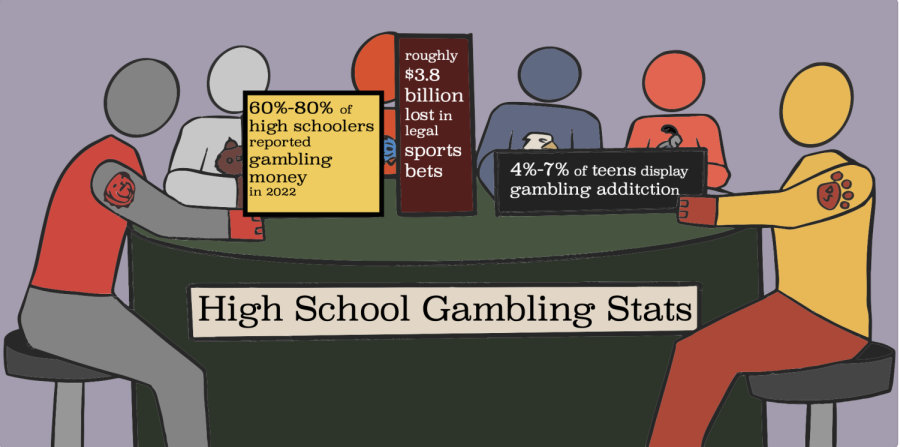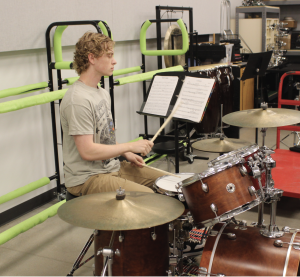Rise in underage sports betting
Increased accessibility has allowed Bowie students to gamble on sports
An increasing number of high schoolers have now joined the betting underworld and aren’t planning to stop anytime soon.
March 14, 2023
When watching your favorite sports team, fans usually care about one thing: winning. However, this is only the case for some, as many fans now care about more than winning: how much a team wins or loses by, how much both teams score, or how much one player scores.
This is the world of sports gambling, a growing industry with 50% of its participants between the ages of 18-34. But these aren’t the only people betting, as an increasing number of high schoolers have now joined the betting underworld and aren’t planning to stop anytime soon.
Underage betting is an illegal practice with massive legal implications. If caught, minors can face punishments such as fines, suspension of their driver’s license, probation, community service, and jail time. To combat this, many teens use unorthodox methods to get their bets placed, like junior *Mo Howard, who is new to the sports betting world.
“My friend actually set me up with a bookie, and the bookie gives you a $50 free play to start and I’ve been betting ever since,” Howard said.
Underage betting isn’t just a Bowie issue, however, as many teens at Bowie have huge group chats with students all over the city and state. Sophomore *Larry Fine has been using an app called Fliff to place bets.
“My friends all started sports betting before me and once I saw them all making money I wanted to get in on it,” Fine said. “The way I decide my bets is by talking in my betting group chat and we decide on the picks for the day.”
Gambling has always been advertised as a way to win big. However, what companies fail to mention are the major financial risks that spark when you start.
“The risk factor of it all really makes me keep coming back to it, seeing the money out there that people win really makes me believe that I can be next,” Howard said.
Sports gambling has consistently become increasingly desensitized by the year, as fantasy football and March Madness pick ’em’ pools aren’t considered to be gambling at this point. Teens are now looking at what would be called “real” betting on stuff like point spreads and money lines.
“I’ve been doing fantasy football for years and it kind of just lost its edge so I moved onto actual sports betting instead,” Howard said. “I wanted to use a bookie because I was able to bet on teams to win and stuff like that instead of just betting on players like Prize Picks.”
Prize Picks is the most popular app for underage gamblers, as all users need is an ID to register and, through a legal loophole, it is considered a fantasy sport which means it’s legal in all 50 states. For junior *Steve Harvey, this made it an easy choice on where to start.
“I use Prize Picks, which is legal in Texas,” Harvey said. “You are allowed to bet on Player props which are like individual betting lines and I use that platform because it’s simple, it’s easy, and it’s legal. I also use it on my dad’s account so that I can bet legally.”
Like any other business, Prize Picks is always trying to reach new consumers. They mostly do this through social media advertising, using influencers to sell their product to a large audience, which mainly consists of teens and young adults,to bring in the most money.
“TikTok influencers have definitely factored in to me starting to bet because I feel like if there’s other people that are my age, that are winning big money why can’t I,” Howard said.
Addiction is the main problem with gambling, as countless people get addicted every year. Rick Benson, a writer for Algamus Gambling Treatment, believes that adults aren’t the only ones affected.
“Teens are two to four times more susceptible to developing a gambling problem than adults,” Benson said. “Teenagers are more likely to develop gambling addictions because the parts of their brains needed for making good, reasonable decisions have not yet been fully developed. Therefore, they are more impulsive and less inhibited.”
Despite Benson’s claim, Harvey doesn’t believe he will ever get addicted.
“I set a limit to myself of four bets a week,” Harvey said. “I do that so that I don’t get addicted. And if I start to notice that I like watching the game and I feel like I need to bet on it or something then I’ll stop betting which I haven’t had to do that yet.”
Fine has witnessed the hardships of betting first-hand, as he believed it to be easy before realizing it’s much more challenging than portrayed.
“My first couple weeks I was down a lot of money because you can’t make the bets yourself; they’re presented to you by the company so it’s hard to win money,” Fine said.
Sports gambling is here to stay and will continue to thrive as the number of states who have legalized betting has jumped from seven in 2018 to now 36. Additionally, three more states have outstanding bills regarding sports betting.
“I think in the next five years, it’ll become legal everywhere,” Harvey said. “There’s just so many ways you can gamble and it’s become so popular everywhere.”
*Some names in this story have been changed to protect the identity of the student as they wish to remain anonymous.











Bob O • Aug 2, 2023 at 2:06 pm
The online businesses are guilty of a crime for allowing minors to bet. With or without knowledge of age. These businesses should also face consequences when minors place bets. All media that accepts money for ads from online companies that allow minor to gamble would be complicit in the crime.
Kristie • May 17, 2023 at 10:18 am
How can I get my underage son blocked from online gambling sites ?
Damian • Jul 27, 2025 at 7:58 am
Just leave him